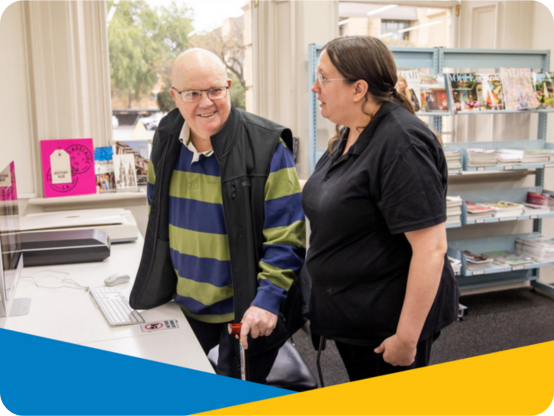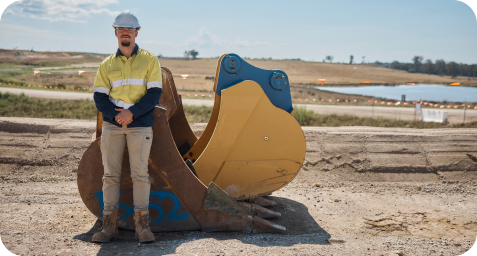Choosing the right pathway
Apprenticeships and traineeships are both nationally recognised pathways that allow you to earn a wage while learning practical skills on the job. Both combine on-the-job training with formal study through a Registered Training Organisation (RTO) like TAFE or another accredited provider.
Why start an apprenticeship or traineeship?

There are plenty of great reasons to choose an apprenticeship or traineeship, such as:
- Gain real-world experience and new skills while earning a wage.
- Receive hands-on training directly in the workplace.
- Work towards a nationally recognised qualification.
- Enjoy flexible study options – full-time or part-time.
- Access the same conditions and benefits as any other employee.
- Graduate with no student debt hanging over you.
- Great incentives for some apprentices and trainees, based on eligibility.
Apprenticeship vs. Traineeship: what's the difference?
Apprenticeships are usually trade-focused, take longer to complete (around three to four years) and often lead to higher-level qualifications in fields such as electrical, plumbing, or carpentry. Traineeships are offered over a broader range of industries and are shorter in duration - typically 12 to 48 months. They can sometimes be office based and lead to a variety of different career pathways.
| Apprenticeship | Traineeship | |
|---|---|---|
| Industry | Structured on-the-job training focused on trades in automotive, electrical, mechanical, bricklaying, plumbing, carpentry | Structured on-the-job training in health, care, support work, infrastructure, engineering, business, IT, digital marketing, hospitality and events |
| Length | Three to four years, full or part-time | 12 months to two years, full or part-time |
| Entry | No qualification needed to start, including Year 10, 11 and 12 students, school leavers | No qualification needed to start, including Year 10, 11 and 12 students, school leavers |
| Pay | Get paid while you train, with set base rates, including full allowances and entitlements | Get paid while you train, with set base rates, including full allowances and entitlements |
| Qualification | Cert II all the way to an Advanced Diploma | Cert II all the way to an Advanced Diploma |
What is a traineeship?
A traineeship is paid, on-the-job training with an employer while you study towards a qualification, with a strong focus on hands-on, practical learning.
It’s ideal if you want to gain a professional, industry-recognised qualification at the same time as building real-world work experience. Traineeships can be full-time or part-time and typically run for one to two years.
Throughout your training, you’ll be mentored by a supervisor who ensures you develop all the right skills. At the end, you’ll earn a nationally recognised qualification, such as: Certificate II, Certificate III and Advanced Diploma.
For example, a Certificate III in Individual Support (Ageing) will give you all the skills to work at an aged care facility or in a client’s home.You can start a traineeship at any time; whether you’re changing careers, finishing school, or even still at school. There are over 700 different traineeships available, with strong demand right now in the health and care sector, particularly for roles in:
- Support work and social care
- Aged care support
- Disability support work
Study and your traineeship

During your traineeship you’ll complete your training with a Registered Training Organisation (RTO). RTOs are education providers like TAFE or technical colleges.
This may be classroom-based training, online or work-based training with an employer. For a certificate course you will have to complete a certain number of modules toward your qualification. If you study full-time you will qualify over 12 months, or two years if you study part-time. You will be awarded your qualification by your RTO at the end of your traineeship.
What is an apprenticeship?
An apprenticeship is a practical qualification where you learn on-the-job while earning a wage, which usually increases as you master new skills. They are typically focused on trade-based roles such as:
- Automotive electrician
- Bricklayer
- Carpenter
- Electrician
- Motor mechanic
- Painter and Decorator
- Plumber
Studying during your apprenticeship

You must complete your certificate or diploma level studies with a Registered Training Organisation (RTO). An RTO is a training provider, like TAFE or a registered employer who is recognised by the government to deliver training and qualifications that are nationally recognised. The training can be delivered online, classroom-based, or on-the-job with an employer. Your RTO also issues your qualification when you finish your apprenticeship.
Find your path. We’ll back you all the way.
We start by getting to know your skills, interests, and goals - then match you with the right employer to guide and support you on the job. As your official employer, we handle the paperwork while you gain real, hands-on experience with a trusted host business. You’ll learn, earn, and grow in a role that fits your future.
And we don’t stop there. We’ll check in regularly, offer mentoring, and keep you on track throughout your apprenticeship or traineeship.